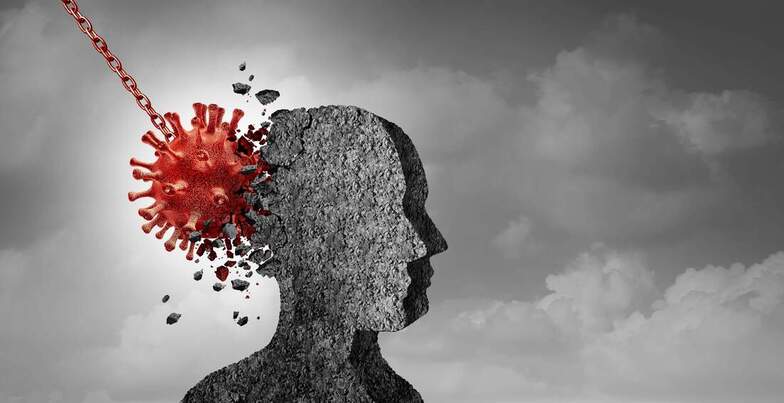|
According to a study published by the Lancet, the negative psychological impact resulting from the coronavirus disease outbreak (i.e., PTSD symptoms, confusion and anger) comes as a result of the stressors associated with the pandemic including longer quarantine duration, infection fears, frustration, boredom, inadequate supplies, inadequate information, financial loss, and stigma. Given this, adopting strategies to protect your mental health becomes imperative as it will help you cope with the uncertainty and the variables that are beyond your control, as well as strengthen your relationship with your loved ones and your community. Here are seven ways you can protect your mental health in the age of COVID-19: 1. Take time to reflect on your own feelings and meditate: Although working from home and social distancing can be unpleasant, it offers you the space and opportunity to focus on yourself. Shifting your attention inward and asking yourself questions such as “How is this situation affecting my actions and behaviors?” will help you be more in tune with your feelings. It is important to approach your feelings without judgement and give yourself permission to be fearful, sad, frustrated, confused, or lonely. Incorporating meditation during your self-reflection can further aid in connecting with yourself, calibrating your emotions, setting intention for the day, and reducing stress and anxiety. 2. Determine when you will access information about coronavirus: Limiting the time you spend watching the news, reading articles, and clicking on coronavirus updates will help you not get caught up in the fear and anxiety inducing narrative. While keeping yourself informed is essential, giving into the panic can be harmful to both your physical and mental health. Excessive exposure to news and social media outlets can increase your stress and fear responses, which can result in rapid heartbeat, headaches, lack of sleep, loss of appetite, anxiety, and depression. 3. Create a routine and stick to it: Setting a routine and abiding by a schedule can help you feel grounded during these tumultuous times. Establishing daily goals that include work as well as self-care activities will lead to feelings of accomplishment and grant you a sense of control. Studies also show that our bodies function better when eating, sleeping and exercise patterns are set to a regular schedule. Make sure your routine incorporates activities you find comforting such as listing to music, taking a bath, doing yoga, journaling, painting, etc. 4. Stay active and go outside (whenever possible): Body movement is proven to be one of the most important things you can do to keep your nervous system regulated. Furthermore, research has linked exercise to stress reduction, improved sleep, mood improvement, self- esteem boosts, and lower risk of depression. Engaging in physical activity outdoors also results in positive outcomes as exposure to nature is shown to improve emotional and mental health while also contributing to physical well-being (e.g., reduces blood pressure, heart rate, muscle tension, and the production of stress hormones). 5. Focus on the positive things as well as the things within your control: Obsessing over what will happen next or when the grocery shelves will be restocked will only add to the stress and fear responses. Instead, try focusing on the positive moments surrounding the uncertainty. For instance, being quarantined at home might offer you more opportunities to connect with your loved ones and spend quality time together. In addition, focus on the things you can control including ensuring the safety of yourself and those around you by washing your hands often, covering your mouth when you cough/nose when you sneeze, avoiding touching your face whenever possible, etc. 6. Engage with others and stay connected: Although social distancing is recommended, quarantine does not have to equate complete social isolation. Studies show that loneliness can be as damaging to our overall health as smoking 15 cigarettes a day. Make it a point to stay in touch with friends, family, neighbors, and coworkers through Skype, phone calls, text messaging, email or any other form of digital communication accessible to you. Staying connected will help you manage stress and guard you against unhealthy coping mechanisms such as drinking and overeating. 7. Do not hesitate to seek professional help: Social distancing has not prevented mental health professionals from offering services to those in need. Many therapists have continued seeing clients while maintaining safety guidelines by moving toward telehealth- based platforms. If you are in need of support and you meet eligibility criteria, Psychology for All can help connect you to the right mental health provider who will offer their services at no cost to you for up to 8 sessions. Additionally, organizations such as BetterHelp and Talkspace will allow you to communicate with mental health professionals through digital messaging at a reasonable price. Sources: https://www.pbs.org/newshour/health/why-your-mental-health-may-be-suffering-in-the-covid-19-pandemic https://www.cnbc.com/2020/03/20/coronavirus-wake-up-millennials-prioritize-your-mental-health-right-now-says-psychotherapist.html https://www.sciencedirect.com/science/article/pii/S0140673620304608 https://blogs.psychcentral.com/neurodivergent/2020/03/anxiety-depression-and-fight-or-flight-response-16-ways-to-cope-with-coronavirus-quarantine-and-self-isolation/
0 Comments
|
AuthorWrite something about yourself. No need to be fancy, just an overview. Archives
June 2024
Categories |


 RSS Feed
RSS Feed
